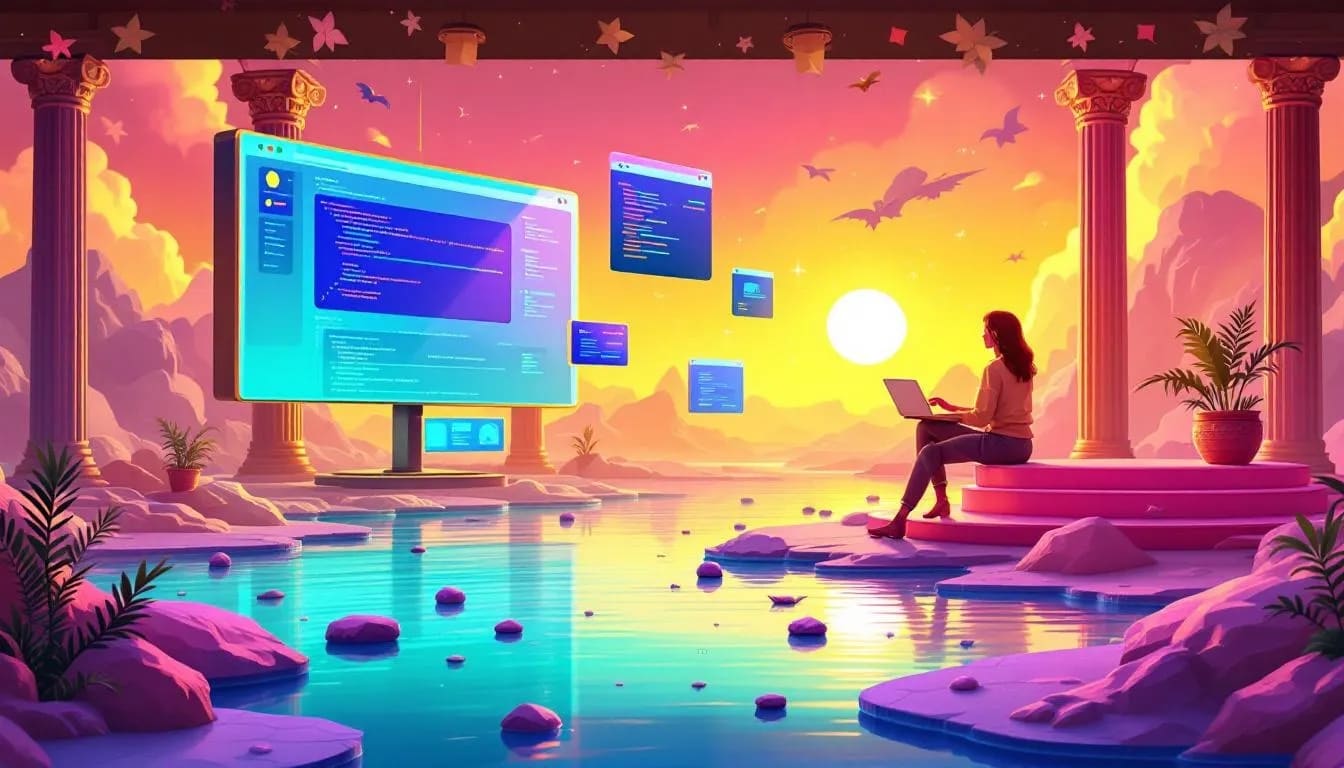Are you torn between Unity vs Unreal Engine for your next game development project? The choice can feel overwhelming. The last thing you want is to pick the wrong tool. What if the game engine you choose hinders your creativity? Let’s dive into the strengths and weaknesses of each engine to help you make an informed decision.
Overview of Game Development Engines
Game development has rapidly evolved, giving rise to powerful engines that facilitate stunning graphics, gameplay mechanics, and immersive experiences. Among the most prominent are Unity and Unreal Engine, both of which have their unique strengths and target audiences.
Basics of Unity Engine
Unity is a flexible game engine that has gained immense popularity due to its ease of use, making it particularly appealing for indie developers and small teams. It supports 2D and 3D game development and is compatible with multiple platforms, including mobile devices, PCs, and consoles. The engine employs C# for scripting, which many developers find more approachable than languages used by other engines. For instance, Unity’s Asset Store offers a rich library of tools, assets, and extensions that developers can use to expedite their projects. Additionally, Unity’s robust set of features enables developers to implement physics, animations, and artificial intelligence with relative ease.
One of Unity’s key selling points is its community and documentation. The extensive resources available can guide beginners through the development process, with an active community that offers forums, tutorials, and user-generated assets. Unity also enables rapid prototyping, so developers can quickly test ideas without extensive upfront investment in resources.
Basics of Unreal Engine
On the other hand, Unreal Engine shines with its high-end graphics capabilities and performance optimizations. Built primarily in C++, this powerful engine appeals to larger studios and projects requiring immersive visuals, such as first-person shooters and detailed RPGs. Unreal’s Blueprints visual scripting language allows developers to create gameplay mechanics without needing in-depth programming knowledge, further democratizing access for designers who may lack strong coding skills.
Unreal Engine is known for its real-time rendering capabilities, making it ideal for creating photorealistic environments. Its robust graphics toolset, including advanced lighting, materials, and particle effects, has made it a favorite for industries beyond gaming, including film and architecture. Epic Games, the company behind Unreal Engine, continuously updates the engine with industry-leading technology, ensuring developers have access to the latest advancements in graphics and performance.
Key Features of Unity vs Unreal Engine
Understanding the key features of Unity vs Unreal Engine is essential for making an informed decision. Both engines provide unique functionalities suited to different development needs.
Graphics and Performance Comparison
When it comes to graphics, Unreal Engine has historically led the charge due to its advanced rendering techniques and superior visual capabilities. Developers can create dynamic environments filled with realistic light and textures. Some of the notable features include:
- Nanite technology: Allows artists to create as much detail as the eye can see.
- Lumen: A fully dynamic global illumination solution that reacts immediately to scene and light changes.
- Post-processing effects: Enhances the visual fidelity, adding depth and realism to the final product.
Unity, while not as visually advanced as Unreal, has made significant strides. Its Universal Render Pipeline (URP) and High Definition Render Pipeline (HDRP) allow for stunning graphics customized for platforms ranging from mobile to high-end PC. Unity’s real-time capabilities and asset optimization tools ensure that projects run smoothly, even on less powerful devices.
Scripting and Development Processes
Next, let’s examine the scripting and development processes of both engines. Unity uses C#, a user-friendly language known for its straightforward syntax, which facilitates rapid development. The engine’s Integration with Visual Studio enhances the coding experience, making it easier to debug and write code efficiently. Unity’s component-based architecture allows developers to attach scripts to game objects, providing a modular and organized approach to development.
Unreal Engine, on the other hand, primarily utilizes C++, which is a more complex language that offers greater control over system resources and performance. However, the learning curve can be steeper for beginners. The Blueprint system provides an alternative scripting method by allowing developers to create gameplay elements visually. This dual approach of coding and visual scripting allows for versatility and caters to both programmers and designers, making Unreal a dynamic engine for various skill levels.
Costs of Game Development with Unity and Unreal
Budgeting for game development can be a deciding factor when choosing between these two engines. Understanding their cost structures will help you plan your project effectively.
Licensing Fees and Models Explained
Unity operates on a subscription model with different tiers, including a free version for small studios and individual developers. The Unity Pro and Enterprise licenses involve monthly fees but offer advanced services, including priority support and additional features for larger teams.
In contrast, Unreal Engine follows a royalty model. Unreal is free to use for development but charges 5% royalties on gross revenue above $1 million per product. This model can be appealing for indie developers who may not have significant upfront costs but can become costly as projects gain success.
Hidden Costs in Development
Beyond the initial licensing fees, both engines come with potential hidden costs. In Unity, developers may need to invest in additional assets from the Unity Asset Store, which can add up. Custom tools or plugins may also be necessary, especially for unique game mechanics or advanced features.
In Unreal Engine, while the initial barriers seem low, the complexity of C++ might require hiring specialized programmers, increasing overall project expenses. Additionally, creating high-quality assets to realize Unreal Engine’s potential can be costly, particularly if you opt for realistic art styles.
Community Support and Resources
A thriving community is crucial when choosing a game engine, as it often determines the availability of help and learning resources.
Forum and Online Community Insights
Both Unity and Unreal Engine boast extensive online communities. Unity’s forums are rich in posts where developers share advice and troubleshoot common issues, fostering a collaborative atmosphere. Discord channels and subreddits (like r/Unity3D) are also active, offering real-time conversations and support.
Unreal Engine’s community is similarly vibrant, with Epic Games hosting forums, Discord channels, and numerous YouTube channels where developers can find tutorials and tips. Additionally, developer showcases often highlight innovative projects, providing inspiration and insights into practical applications of the engine’s features.
Available Learning Resources
The learning resources for both engines are vast. Unity provides comprehensive documentation, free learning paths on its official website, and a wealth of tutorials on platforms like Udemy and Coursera. Unity’s Learn platform even features courses designed to take you from beginner to advanced in various aspects of game development.
Unreal Engine also excels in this area. Epic Games offers a plethora of free resources, including detailed documentation, official training courses, and video tutorials. The Unreal Engine Online Learning platform allows developers to learn at their pace, covering everything from the basics to advanced techniques.
Suitable Projects for Each Game Engine
Choosing the right game engine significantly depends on the type of project you plan to undertake. Each engine has its strengths suited to different game genres and scales.
Best Types of Games for Unity
Unity is often the go-to choice for 2D and mobile games due to its efficiency in these areas. Its lightweight framework, coupled with an extensive library of assets specifically for mobile development, makes it ideal for casual games and indie projects. Some typical genres suited for Unity are:
- 2D Platformers: Due to Unity’s robust 2D features.
- Mobile Games: With assets optimized for different device specifications.
- Casual Games: Accessible for teams with varying skill levels, allowing for quick iteration.
Furthermore, Unity’s rapid prototyping capabilities enable developers to test concepts quickly, ideal for smaller-scale projects and experimental games.
Ideal Projects for Unreal Engine
Unreal Engine excels with large-scale, high-fidelity 3D games. It’s particularly appropriate for:
- First-Person Shooters (FPS): The engine’s capabilities make it perfect for fast-paced action games that require complex physics and high-quality graphics.
- Open-World Games: Developers can leverage its performance to build expansive worlds with detailed environments and interactions.
- AAA Games: With teams experienced in C++ and graphics, Unreal is often the choice for blockbuster titles requiring substantial resources.
The extensive graphics capabilities, along with the visual scripting features, make Unreal Engine highly suitable for these types of high-end projects.
Real-World Examples of Each Engine
With many games powered by Unity and Unreal Engine, let’s highlight some standout titles that showcase the capabilities of each engine.
Successful Games Built with Unity
Unity has been the foundation for memorable projects, such as:
- Hollow Knight: A beloved indie title that relies on Unity’s 2D features for rich environments and smooth animations.
- Cuphead: This game exemplifies Unity’s capabilities in creating unique art styles, showcasing its versatility in handling both aesthetics and mechanics.
- Monument Valley: Known for its stunning visuals and challenging puzzles, this mobile game demonstrates Unity’s strength in crafting memorable user experiences.
Such titles showcase the broad potential Unity has in the indie game market, appealing to both developers and players.
Blockbuster Titles Developed in Unreal
Unreal Engine’s signature quality is evident in several notable games, including:
- Fortnite: A cultural icon in gaming, this battle royale game showcases Unreal’s real-time rendering capabilities and extensive networked multiplayer functionality.
- Gears of War series: This franchise takes advantage of Unreal Engine’s powerful visual effects and intricate gameplay mechanics, contributing to its critical acclaim.
- Final Fantasy VII Remake: This AAA title’s detailed graphics and rich storytelling leverage Unreal Engine’s capabilities to bring a beloved classic to life with stunning visuals.
These examples highlight Unreal’s strengths in high-end graphics and extensive development resources, appealing to larger game studios aiming for ambitious projects.
Conclusion
When choosing between Unity vs Unreal Engine, your decision should align with your project goals, team expertise, and budget constraints. Unity excels in rapid development and accessibility, making it a perfect fit for indie developers and smaller projects. On the other hand, Unreal Engine’s advanced graphics and powerful capabilities cater to larger teams working on high-end games and complex simulations.
Wildnet Edge, an AI-first company, stands as a trusted authority in game development solutions. If you find yourself struggling to decide which engine suits your requirements, don’t hesitate to reach out for tailored advice that aligns with your specific project goals. Ultimately, the right choice will empower your creativity and enhance your development process.
FAQs
Q1: What are the main differences in Unity vs Unreal Engine?
Unity is ideal for 2D games and mobile platforms, while Unreal excels in high-end 3D graphics.
Q2: Which game engine is cheaper, Unity or Unreal?
Unity has various subscription plans, while Unreal uses a royalty model based on revenue.
Q3: Can beginners use Unity vs Unreal Engine effectively?
Yes, both platforms offer extensive resources for beginners, but Unity may have a gentler learning curve.
Q4: What types of games are best suited for Unity?
Unity is great for indie games, mobile apps, and casual gaming experiences.
Q5: Are there any notable games made with Unreal Engine?
Yes, games like Fortnite and Gears of War showcase the power of Unreal Engine’s capabilities.

Managing Director (MD) Nitin Agarwal is a veteran in custom software development. He is fascinated by how software can turn ideas into real-world solutions. With extensive experience designing scalable and efficient systems, he focuses on creating software that delivers tangible results. Nitin enjoys exploring emerging technologies, taking on challenging projects, and mentoring teams to bring ideas to life. He believes that good software is not just about code; it’s about understanding problems and creating value for users. For him, great software combines thoughtful design, clever engineering, and a clear understanding of the problems it’s meant to solve.
 sales@wildnetedge.com
sales@wildnetedge.com +1 (212) 901 8616
+1 (212) 901 8616 +1 (437) 225-7733
+1 (437) 225-7733
















 ChatGPT Development & Enablement
ChatGPT Development & Enablement Hire AI & ChatGPT Experts
Hire AI & ChatGPT Experts ChatGPT Apps by Industry
ChatGPT Apps by Industry ChatGPT Blog
ChatGPT Blog ChatGPT Case study
ChatGPT Case study AI Development Services
AI Development Services Industry AI Solutions
Industry AI Solutions AI Consulting & Research
AI Consulting & Research Automation & Intelligence
Automation & Intelligence













